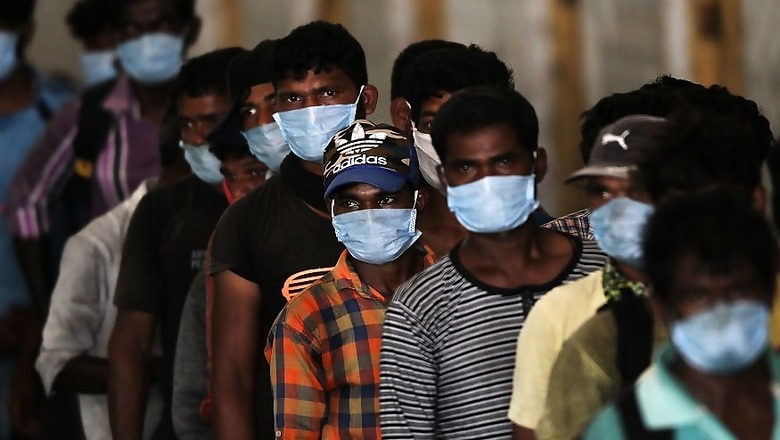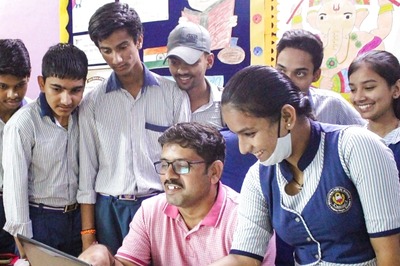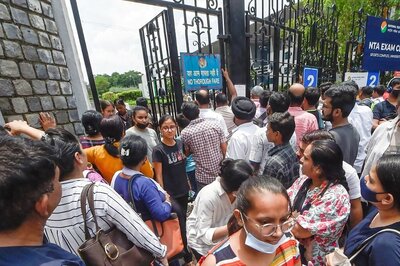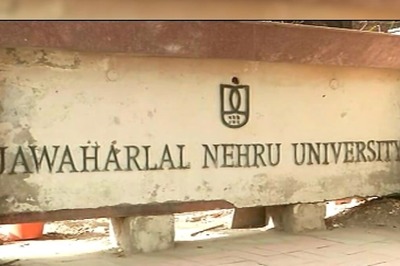
views
A number of restrictions on economic activities and services imposed as part of a nationwide lockdown will be relaxed from Monday in areas barring the containment zones demarcated by the states as the Centre looks to restart the economy after 26 days of shut down.
The central government had come out with detailed guidelines for the phase-2 of the lockdown that will end on May 3, but some of the rules have since been tweaked, while some states have decided to forge their own path on reopening.
While Kerala looks forward to lift certain restrictions, Delhi and Punjab have announced that the restrictions will remain in place despite the relaxations and exemptions that are set to come into effect from Monday.
Delhi Chief Minister Arvind Kejriwal announced that the national capital will continue to remain under lockdown as it accounted for 12% of the total cases in the country. The government will, however, assess the situation again after one week.
Following suit, Punjab CM Amarinder Singh also stated that the curfew in the state will not be relaxed, except for the procurement of wheat. The situation will be reviewed again, he added.
The Kerala government, on the other hand, released guidelines to reopen the state in a staggered manner. The "red zone" districts of Kasargod, Kannur, Kozhikode and Malappuram will continue to be under strict lockdown, while private vehicles will be allowed as per an odd-even scheme within other districts. Restaurants will also be allowed to host dine-in customers till 7 pm and serve take-out till 8 pm.
The Central Government also announced that supply of non-essential e-commerce goods will remain prohibited even as the country looks forward to some relaxation of curbs starting Monday. The announcement comes after a number of questions were raised by the opposition and traders about the government's decision.
Here's a lowdown on what remains prohibited and what will be allowed from Monday onwards:
WHAT IS PROHIBITED
- All domestic and international air travel for passengers
- All passenger movement by trains, except for security purposes.
- Buses for public transport.
- Metro rail services.
- Inter-district and inter-state movement of individuals except for medical reasons or for activities permitted under these guidelines.
- All educational, training, coaching institutions to remain closed.
- All industrial and commercial activities other than those specifically permitted under these guidelines.
- Hospitality services other than those specifically permitted under these guidelines.
- Taxis, auto rickshaws and cycle rickshaws and services of cab aggregators.
- All cinema halls, malls, shopping complexes, gymnasiums, sports complexes, swimming pools, entertainment parks, theatres, bars and auditoriums, assembly halls and similar places.
- All social, political, sports, entertainment, academic, cultural, religious functions and other gatherings.
- All religious places/places of worship to remain closed for public. Religious congregations are strictly prohibited.
- In case of funerals, congregation of more than twenty persons will not be permitted.
NO RELIEF FOR HOTSPOTS
'Hotspots' or areas of large Covid-19 outbreaks, or clusters with significant spread of the virus, will be determined as per the guidelines issued by the health ministry. In these hotspots, containment zones will be demarcated by States/ UTs/ District administrations as per the guidelines.
In these containment zones, the activities exempted under the new guidelines will not be permitted. There shall be strict perimeter control in the area of the containment zones to ensure there is no unchecked inward/outward movement of population from these zones except for maintaining essential services.
WHAT HAS BEEN ALLOWED
Health sector
- All health services and the social sector to remain functional; public utilities to function without any hindrance
- Chemists, pharmacies, veterinary hospitals to remain open. Manufacturing units of drugs, medical equipment, construction of media infrastructure to be allowed.
Agriculture sector
- Farming operations, including procurement of agricultural products, agriculture marketing through notified Mandis and direct and decentralized marketing, manufacture, distribution and retail of fertilizers, pesticides and seeds;
- Activities of marine and inland fisheries
- Animal husbandry activities, including the supply chain of milk, milk products, poultry and live-stock farming; - - Tea, coffee and rubber plantations are allowed to be functional.
- Industries operating in rural areas, including food processing industries; construction of roads, irrigation projects, buildings and industrial projects in rural areas; works under MNREGA, with priority to irrigation and water conservation works; and operation of rural Common Service Centres (CSCs) have all been allowed.
- Operation of the fishing, aquaculture industry. Movement of fish products now allowed.
- Operations of tea, coffee and rubber plantations, with maximum of 50 per cent worker.
- Collection, processing, distribution and sale of milk and milk products.
- Operation of animal husbandry farm.
- Operation of animal shelter homes
Financial sector
- The important components of the financial sector, e.g., RBI, banks, ATMs, capital and debt markets as notified by SEBI and insurance companies will also remain functional
- SEBI, and capital and debt market services as notified by the Securities and Exchange Board of India
- IRDAI and Insurance companies
Social sector
- Operation of homes for children, mentally disabled, senior citizens, destitutes
- Operation of Anganwadis, observation homes. Disbursement of social security measures
- MNREGA works are allowed with strict implementation of social distancing and face mask
Public utilities
- Petrol pumps, LPG, Petroleum and gas retail and storage outlets
- Generation, transmission and distribution of power at Central and State/UT levels
- Postal services, including post offices
- Operations at municipal, local body levels
- Telecommunications and internet
Transport and Goods
- Transportation of goods will be permitted without any distinction of essential or non essential.
- Operation of railways, airports, seaports for transport of good and cargo movement
- Operation of land ports for transport of essential services
- Movement of all trucks with two drivers and one helper
Essential services
- All facilities in supply chain of essential goods.
- Shops, including ration shops (under PDS), dealing with food, groceries, fruits and vegetables, dairy and milk booths, meat and fish, animal fodder, fertilizers, seeds and pesticides. No restriction on timing. However, district authorities may encourage and facilitate home delivery to minimize the movement of individuals outside their homes.
- Print and electronic media.
- E-commerce operations for essential items, couriers services are allowed
- Cold storage and warehousing services.
- Data and call centers for Government activities only.
- Hotels, home stays, lodges and motels, which are accommodating tourists and persons stranded due to lockdown, medical and emergency staff, air and sea crew.
- Services provided by self-employed persons like electrician, plumber, repairmen, carpenters and motor mechanics.
Industries
- In addition to manufacturing of essential goods and rural industries, establishments engaged in production of coal, mine, mineral, packaging material, jute, brick kilns
- Manufacturing and other industrial establishments with access control will be allowed in SEZs, EoUs, industrial estates and industrial townships after implementation of SOP for social distancing. Manufacture of IT hardware and of essential goods and packaging can resume.
Construction
- Construction of roads, irrigation projects, buildings and all kinds of industrial projects
- Construction of renewable energy products
Others
- Defence, Central Armed Police Forces, Health and Family Welfare, Disaster management and Early Warning Agencies
- Police, home guards, civil defence, fire and emergency services
- All other departments of State/UT to work with restricted staff
Movement of Persons Allowed in Following Cases:
- Private vehicles for emergency services, including medical and veterinary care, and for procuring essential commodities. In such cases, one passenger besides the private vehicle driver can be permitted in the backseat in case of four-wheelers. In case of two-wheelers, only the driver of the vehicle is to be permitted.
- All personnel travelling to place of work and back in the exempted categories




















Comments
0 comment